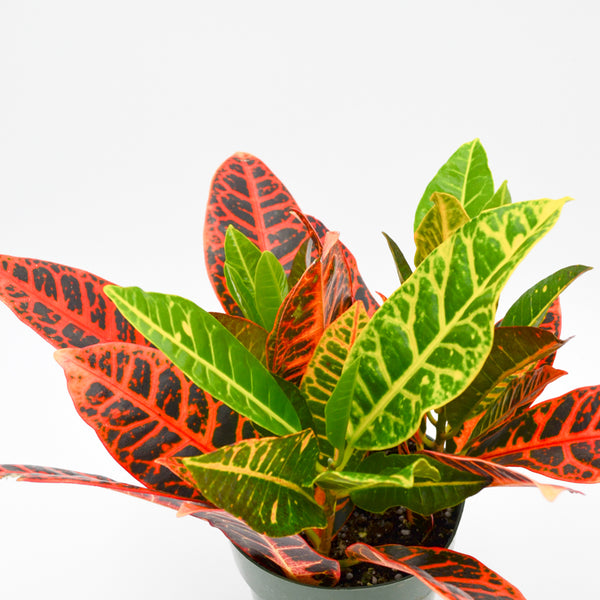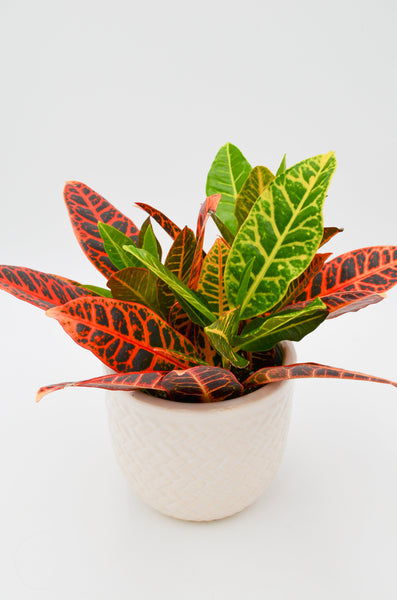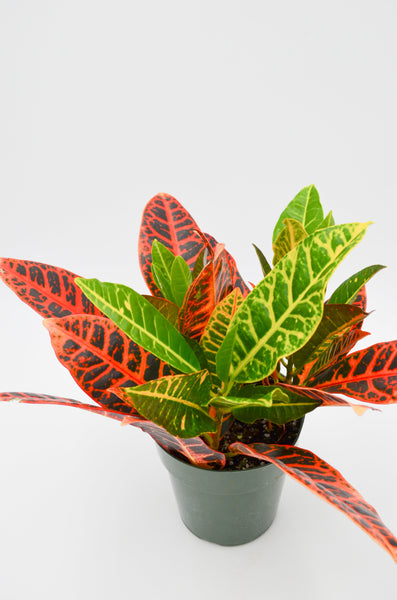Croton (Codiaeum variegatum)
Croton, botanically known as Codiaeum variegatum, is a vibrant and colorful tropical houseplant, native to Southeast Asia and the Pacific Islands. Crotons are famous for their striking, variegated foliage, which displays a range of colors, including red, yellow, green, purple, and orange. They add a dramatic, eye-catching touch to any indoor space and are relatively easy to care for once you understand their needs.
To ensure your Croton plant thrives, follow these care instructions:
-
Light: Crotons require bright, indirect sunlight to maintain their vibrant foliage colors. Place them near a south or east-facing window with filtered light. Insufficient light can cause the plant to lose its bright colors and revert to green.
-
Water: Water your Croton when the top inch of the soil feels dry to the touch. Make sure to use well-draining soil and a pot with drainage holes to prevent root rot. Be cautious not to overwater or underwater, as both can cause leaf drop.
-
Humidity: Crotons prefer a humid environment, as they are tropical plants. Maintain humidity levels of 40-60% by placing a tray of water with pebbles beneath the plant, using a humidifier, or misting the plant regularly.
-
Temperature: Crotons thrive in temperatures between 65°F and 80°F (18°C to 27°C). Keep the plant away from drafts, air conditioning vents, and heating sources to prevent temperature fluctuations.
-
Fertilizing: Feed your Croton with a balanced liquid fertilizer diluted to half strength every 4-6 weeks during the growing season (spring and summer). In fall and winter, reduce feeding to once every 8 weeks, as the plant's growth slows down.
-
Pruning: Prune your Croton plant to maintain its shape and encourage bushier growth. Trim back any leggy stems, and remove yellowing or damaged leaves. Pruning is best done in early spring before the growing season begins.
-
Repotting: Repot your Croton every 2-3 years, or when it outgrows its current pot. Choose a pot one size larger, with drainage holes, and use a well-draining potting mix to ensure the plant's health.
Pet-Friendliness and Toxicity:
According to the ASPCA's website, the Croton plant (Codiaeum variegatum) is toxic to cats, dogs, and other pets. The plant contains chemicals that can cause skin irritation upon contact and, if ingested, can lead to gastrointestinal upset, such as vomiting and diarrhea. It is crucial to keep the Croton plant out of reach of pets and monitor them for any signs of ingestion or contact. If you suspect your pet has come into contact with or ingested a toxic plant, seek immediate veterinary assistance.






